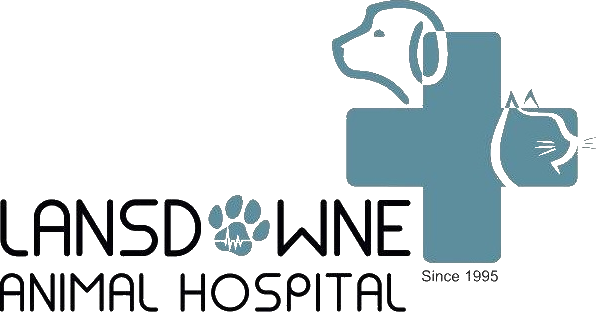Adult dogs have 42 and adult cats have 30, any guesses? Teeth! With so many teeth, it’s no wonder our beloved pets need proper dental care. As a person, you probably attend the dentist every year or so, just as your pet should have his or her teeth checked during each annual exam. And yes, they also benefit from a daily dental hygiene routine! Don’t forget that animal’s age much quicker than humans, and teeth can show early signs of dental disease at a much younger age.
It is estimated that about 90% of pets over 2 years old have substantial dental disease, out of which 50% require immediate treatment (OVMA statistic). When plaque and tartar build up on teeth, inflammation can occur, this is called gingivitis. When this goes unchecked for too long it can lead to degeneration of the tooth and supporting structures, this is known as periodontal disease. Once periodontal disease occurs, it cannot normally be treated. It is progressive and can only be slowed down through intervention, and can still cause discomfort and pain in your pet. It can also lead to bad breath, the separation of gums from the teeth (periodontal pockets) , abscesses and tooth loss. In cats, it is also common for them to develop “resorptive lesions”. These are holes in the tooth that go through the enamel(outer part of tooth) into the dentin. If left untreated, it can cause pain and loss of teeth.
Periodontal disease is not only uncomfortable for your pet’s mouth, but it can also impact other areas of the body. Your pet will be put at risk for infections in the heart, kidneys, lungs and joints. How does an issue in the mouth affect the entire body? Because the build up of bacteria from the mouth gets into the bloodstream and is spread throughout the body. Don’t allow this to happen, preventative measures can be taken!
To prevent dental disease in your pet, home dental care is the first step. It is usually best to start when your pet is young in order to desensitize them to this procedure. Also, remember that it takes patience in order to achieve success with at home dental care. The best way to start is by getting your pet used to you touching the mouth area and rubbing the teeth or gums with your fingers. Once they are comfortable with this, you can purchase either a children’s toothbrush, adult soft bristle brushes or specialized pet toothbrushes to clean their teeth with. Brushing on a daily basis is the best method, as plaque begins to build within only a few hours of the teeth being cleaned. This daily cleaning routine is effective in that it will help prevent plaque from becoming calcified (tartar) and more difficult to remove. There are toothpastes available for pets as well which are palatable for them so that they can look forward to teeth cleanings (and make things easier for you!). Specialized dog and cat dental treats and are now available as well (some containing enzymes), and daily dry dental diets that work through both mechanical action and through enzymatic action. With so many options available, it’s now easier than ever!
Although, if your pet has specific dental issues or already has periodontal disease, then a dental under anesthesia is recommended. The reason anesthesia is recommended is because it is the only way to get a really good look in your pet’s mouth, while keeping him or her comfortable and pain free. Anesthesia also allows any extractions or dental work to be completed at the same time. During this medical procedure, your pet’s gums are probed to assess depth of periodontal pockets, which normally coincide with dental disease. The teeth are also scaled (cleaned) either by hand or with an ultrasonic scaler, then cleaned under the gum line. The veterinary professional will then also polish the teeth to remove any tiny abrasions caused by the cleaning, and many times a bonus fluoride treatment is also applied. This provides your pet with an in depth cleaning and they will wake up with much happier mouths and gums.
Oral hygiene is one of the most neglected areas of veterinary healthcare, therefore we will help you with anything possible that you need to get started with making a difference in your pet’s life. If you have any questions or concerns regarding your pet’s dental health, feel free to speak with the staff at the Lansdowne Animal Hospital. We can give you some good tips for at home dental care, provide you with a lesson/demonstration on how to brush your pet’s teeth or assist you to the most appropriate bag of dental food or treats for your individual pet’s needs. These products and services are all available in order to help your pet feel his or her best!
